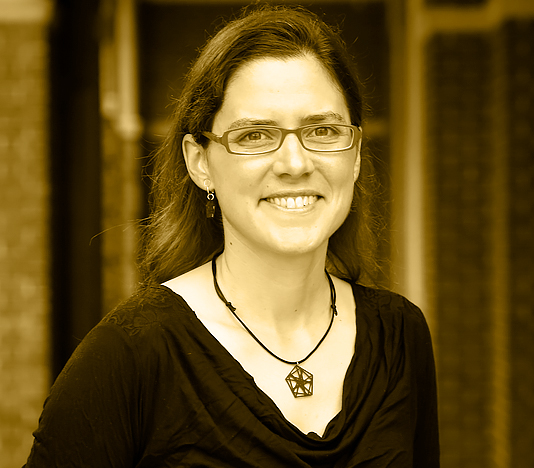Diana Davis

“Don’t be a boring mathematician.” That’s the advice Diana Davis ’03 recently gave a group of graduate students at her alma mater, Brown University. So, it’s not surprising to learn that when she was earning her Ph.D., she explained her theorem on geometric surfaces in a decidedly nontraditional way — through a dance video.
“A lot of math Ph.D. results are about really abstract things, things that you can’t explain rigorously to the person next to you on the airplane,” she says. “I knew I could make a dance which was my actual result, not a metaphor, nothing brushed under the rug. Figuring out how to express it through dance, it actually made me understand my results much more smoothly.”
In the nearly 5-minute short, “Cutting Sequences on the Double Pentagon,” which she posted online, a student leaps across the surface of a pentagon, her path creating lines, cutting a sequence of colors, as classical music plays in the background. Davis recorded the movements on an iPad taped to a board, tied to a chair, suspended in the air. The effort earned her an award from Science magazine — and a following. She now counts more than 1,000 subscribers on her YouTube channel and has been invited to speak at math conferences in 23 states and nine countries.
Davis celebrates the art of mathematical ideas further in her new book, Illustrating Mathematics. “The main ways that people express ideas in math are with words, equations, and line drawings,” she says. “But you can use laser cutting, 3-D printing; you can knit things; you can use paper folding and stitching. Math is beautiful and I love to get the word out.”
Her enthusiasm for using innovative techniques to elucidate mathematical ideas grew out of her time as a student at Exeter. “I remember Philip Mallinson, he was a math teacher, and his classroom was just full of geometry toys,” she says. “His table had all these objects on it and above the chalkboard there were hubcaps, because hubcaps have interesting symmetries. One day he told us, ‘They say that the person who dies with the most toys wins. I’m ahead.’ And I always think about that. I like having geometry toys, because they help you think, and they’re fun.”
Her biggest mentor by far, she says, was Rick Parris. “I was fortunate to have him for math in my prep fall and also as a cross-country coach” she says. “He was a big part of writing the problem-based curriculum that’s so innovative and influential at Exeter. I would say that curriculum is what made me a mathematician. I loved learning math in this way, I loved discovering math, and I loved talking about it with my classmates and presenting it to my classmates.”
This fall, Davis returned to Exeter as a full-time instructor in mathematics. It’s a position she is somewhat familiar with. She taught for many years at Exeter Summer, completed an internship in the math department in 2008, and has helped advance the Harkness pedagogy among fellow instructors at the Anja S. Greer Conference on Mathematics and Technology since 2004, working up from student helper to leader.
Most recently, she held posts as a visiting assistant professor at Swarthmore College and Williams College; and was a postdoctoral lecturer at Northwestern University, where she received the Math Department award for Excellence in Teaching.
Transitioning from Harkness student to teacher has been a process for the New Hampshire native. “It’s like opposite skills,” she says. “I had honed this skill of having an idea, expressing an idea, coming up with a good example, drawing a good figure, explaining things well. But then, to be a good Harkness teacher, you want to create a situation where students have ideas and students can explain things. You can’t just sit there and wait for them to do it, either. You have to carefully craft an environment. That’s not a skill that you learn as a Harkness student at all. It is a hard thing to learn, which I’m of course still working on.”
Davis is bringing her finely honed math skills to bear outside the classroom as well. “I have always wanted to have a positive impact on the world and use my skills to do that,” she says. “I have been able to do that through teaching, but my sphere of influence is small.”
This past summer, she guided a group of 40 undergraduate and high school students to help find mathematical solutions to detect and combat political gerrymandering and segregation in school districting. “With the gerrymandering project, we did data science research, we got data on four states, and we made incremental progress towards bending the arc of history towards justice.”
For Davis, math teaches more than numbers. “Math teaches you to question others’ assertions, to be skeptical of what people tell you, to want evidence and want proof,” she says. “That kind of skepticism and looking for proof is something that is really important in greater life.”